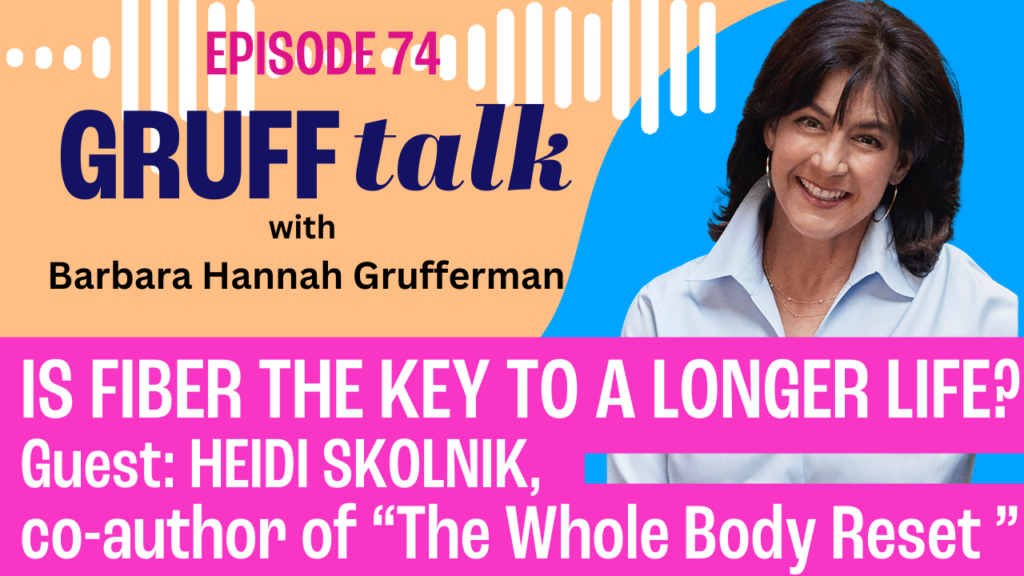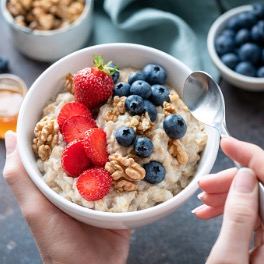Listen to this week’s episode of GRUFFtalk: How to Age Better podcast to hear what nutritionist and NYT best-selling co-author of ‘The Whole Body Reset‘ Heidi Skolnik has to say about this crucial nutrient.
In today’s health-conscious world, we often find ourselves flooded with information about the ‘next big thing’ in nutrition. From superfoods to cutting-edge supplements, the list is endless. However, one essential component that has withstood the test of time and continues to reign supreme in its health benefits is fiber.
What is Fiber?
Dietary fiber, often simply termed as ‘fiber,’ is the indigestible part of plant foods that passes through our digestive system, absorbing water along the way and easing bowel movements. There are two main types:
- Soluble fiber: This type dissolves in water, forming a gel-like substance. It’s found in oats, peas, beans, apples, and citrus fruits.
- Insoluble fiber: This type promotes the movement of material through your digestive system. Whole-wheat flour, wheat bran, nuts, beans, and vegetables are rich in insoluble fiber.
Why Should You Care About Fiber?
There’s a reason dietary experts and nutritionists can’t stop raving about fiber. Here are a few compelling reasons:
- Digestive Health: Fiber aids in digestion, preventing constipation and promoting regular bowel movements. This not only helps you feel more comfortable but also ensures the removal of waste from your body efficiently.
- Heart Health: Several studies have linked high fiber intake, especially soluble fiber, with reduced levels of ‘bad’ LDL cholesterol. This lowers the risk of heart diseases and promotes overall cardiovascular health.
- Weight Management: Fiber-rich foods tend to be more filling, meaning you’re likely to eat less and stay satisfied longer. Plus, they typically have fewer calories for the same volume of food, assisting in weight management.
- Blood Sugar Control: Soluble fiber can slow the absorption of sugar, which for people with insulin sensitivity can help improve blood sugar levels.
- Longevity: Recent research indicates a potential link between high fiber intake and increased lifespan. A diet rich in fiber seems to be associated with a reduced risk of dying from heart disease and all cancers.
Incorporating Fiber into Your Diet:
Adding fiber to your diet is easier than you might think:
- Start your day right: Opt for a whole-grain or bran cereal for breakfast. Oats, for instance, can be a delicious and versatile choice.
- Veggie Delight: Aim to fill half your plate with vegetables at lunch and dinner. Not only does this boost fiber intake, but it also ensures you get the necessary vitamins and minerals.
- Switch to whole grains: From bread to rice, choose whole grain over refined grains.
- Snack Smart: Fresh fruit, raw vegetables, or a handful of nuts can be a great snack choice.
- Stay Hydrated: As you increase your fiber intake, it’s essential to drink plenty of water. Fiber works best when it absorbs water, making your stool soft and bulky.
Last Thoughts . . .
In the vast universe of nutrition, dietary fiber shines as a consistent and undeniable force for good health. As we continue to understand more about our bodies and the profound impact of our dietary choices, it’s clear that fiber is not just a recommendation; it’s a necessity. Whether you’re aiming for improved digestion, better heart health, or just an overall sense of well-being, embracing a fiber-rich diet could be one of the best decisions you make for your health.
LISTEN TO THIS WEEK’S EPISODE ON THE IMPORTANCE OF FIBER HERE

































































